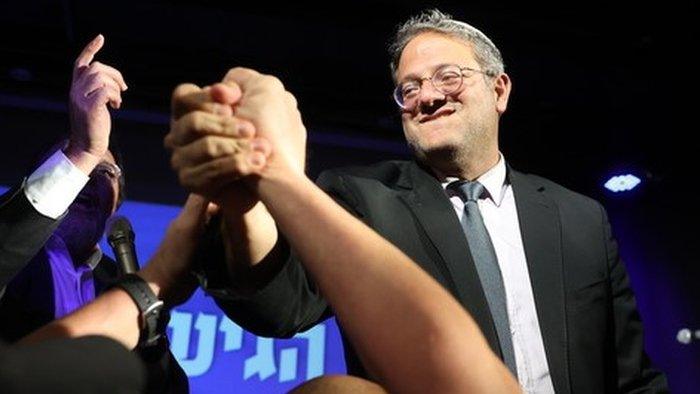Israel PM-elect Netanyahu's deal plans to bolster settlements
- Published

Settlements and outposts are one of the most divisive issues of the Israel-Palestinian conflict
A deal between Israel's prime minister-elect and his far-right partner reveals the likely next government's highly controversial plans for settlements.
It includes moves to legalise dozens of outposts in the occupied West Bank.
If the plan becomes policy, it will set Israel on collision course with the Palestinians and its foreign allies.
Jewish settlements are widely seen by the international community as illegal, but Israel disagrees. Outposts though are illegal even under Israeli law.
Prime Minister-elect Benjamin Netanyahu's right-wing Likud party sent out a statement on Wednesday on what they agreed would go into the coalition agreement, which has yet to be signed.
It says they also decided to create Jewish religious seminaries in two evacuated outposts - Evyatar and Homesh.
That would inflame tensions with Palestinians in nearby villages, which have seen regular protests against settlers trying to take over the land, often leading to deadly clashes with Israeli soldiers.
"We don't care what was agreed, the people of our town will resist the settlers' presence," Dr Hutifa Badir from Beita, a village near Nablus and by the Evyatar outpost, told the BBC.
"We arm ourselves with the blood of martyrs and the wounded. We're committed to our land, and we will not give up on it whatever the cost."


The deal between Likud and the Otzma Yehudit (Jewish Power) party of extremist Itamar Ben-Gvir would also see new infrastructure.
A total of $500m (€484m; £425m) would be budgeted for settler bypass roads and the expansion of Highway 60, the main traffic route used by West Bank settlements. These would connect them more easily with towns and cities in Israel.
In addition, a proposed law would set minimum sentences for what is termed "agricultural crime".
Palestinian activists say this would allow greater impunity when Israeli settlers attack or harass Palestinian farmers on their land.
The Palestinian foreign ministry called on the international community and Washington in particular, to take the needed steps to ensure the agreement was not implemented.
It stated that it would lead to the "entrenchment and expansion of settlements".
The ministry added the deal was another blow for the hopes of any future return to peace talks with Israel, and the two-state solution - the internationally approved formula for peace to end the Israel-Palestinian conflict.
The Religious Zionism alliance - which brings the Religious Zionism party and Otzma Yehudit together - saw a surge in support in Israel's election at the start of this month and finished as the third biggest party in parliament.

The Religious Zionism alliance of Itamar Ben-Gvir (L) and Bezalel Smotrich (R) is the third biggest in parliament
Much of its focus is on the West Bank, which Israel has occupied since the 1967 Middle East War. The alliance's two hard-line leaders - both settlers - see it as part of a "Greater Israel". They consider the land as a Biblical birthright and vital to Israeli security.
Palestinians claim the West Bank and Gaza Strip for their hoped-for future state, with a capital in East Jerusalem.
Although Mr Ben-Gvir has made progress in coalition talks with the prospective prime minister, it is not clear whether he will get his wish of becoming minister of internal security, in charge of the police.
That would be a turnaround for a figure with past convictions for racism and belonging to a banned Jewish militant group.
There are also still key issues in contention between the prospective prime minister and Bezalel Smotrich, who heads the Religious Zionism party.
Mr Smotrich is understood to be demanding to be made defence minister. The job directly influences policies on the West Bank and Gaza.
Israeli media report there have been warnings from the US regarding the appointment. Washington works closely with the Israeli defence ministry and shares highly sensitive security information.
In response, the Religious Zionism party called on the Biden administration to "respect Israeli democracy and not get involved in the formation of an elected government".
- Published2 November 2022

- Published1 November 2022

- Published29 October 2022
